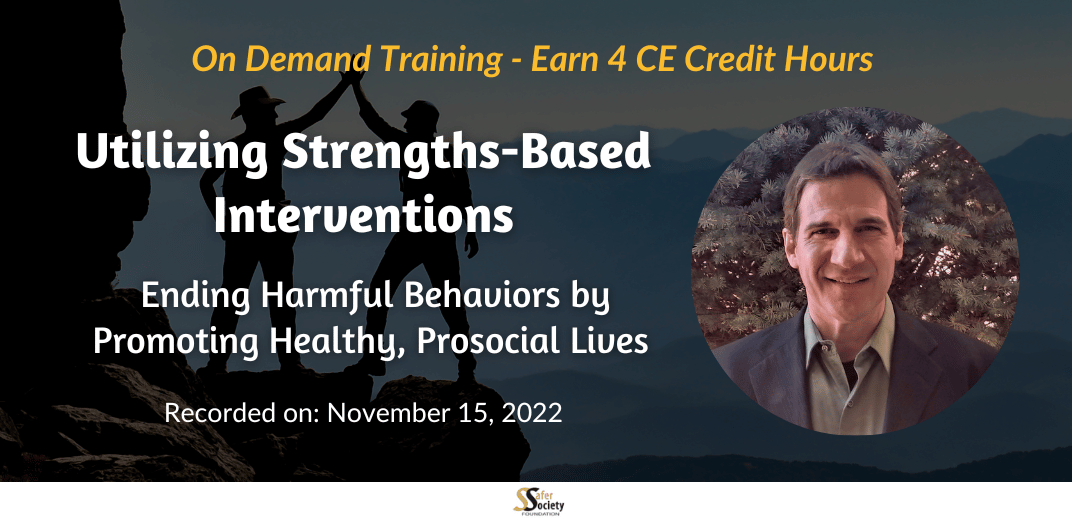
Utilizing Strengths-Based Interventions: Ending Harmful Sexual Behaviors by Promoting Healthy, Prosocial Lives
Already purchased an On Demand training?
Click here to access your Safer Society On-Demand Training Center account.
Individuals entering sex offense-specific services often present with complex emotional states, including mistrust, defensiveness, hopelessness, shame, and anger. These psychological barriers can significantly impede the effectiveness of therapeutic interventions. A Strengths-Based Approach (SBA) helps create an environment in which these clients begin to feel psychologically safe, open, and engaged in services. Growing empirical evidence supports utilizing strengths-based practices in not only mitigating harmful sexual behaviors but also in developing and reinforcing skills that are essential for leading healthy, prosocial lives.
Presenter Kevin Powell, PhD organized the discussion of SBA concepts and interventions into six areas:
- Relationship development
- Optimistic attitude (hope) development
- Asset development (e.g., goals and protective factors)
- Prosocial development
- Intellectual development
- Provider development.
Powell also incorporates strategies for addressing dynamic risk factors with strengths-based alternatives and utilizing proactive, prevention-oriented interventions.
Core topics covered in this training include:
- Definition and principles of strengths-based approaches
- Strategies for establishing positive, trusting relationships with clients
- Interventions designed to instill hope in clients
- Key protective factors for promoting resilience in youths and adults
- Methodologies for identifying and targeting approach goals
- Strengths-based alternatives for addressing dynamic risk factors
- Techniques for meeting basic human needs within the therapeutic context
- Strategies for promoting prosocial life skills
- Self-care strategies for practitioners to mitigate the risk of burnout
By adopting this strengths-based framework, practitioners can enhance the effectiveness of sex offense-specific services while promoting positive outcomes for clients and maintaining their own professional well-being.
1) Describe what a strengths-based approach is
2) Plan and implement interventions for forming trusting, positive relationships with youth and adult clients
3) Plan and implement interventions that promote hope within clients and providers
4) Utilize solution-focused interview questions
5) Explain the difference between an approach goal vs. an avoidant goal
6) Describe protective factors commonly associated with resilience in youths and adults
7) Describe primary prevention strategies, including components of safe, stable, nurturing relationships.
Audience
This training is for professionals who work with clients with problematic behaviors, including social workers, psychologists, counselors, and therapists,
Content Level
Disclosure
Continuing Education Approval
American Psychological Association (APA)
Safer Society Foundation, Inc. is approved by the American Psychological Association (APA) to sponsor continuing education for psychologists. Safer Society Foundation, Inc. maintains responsibility for this program and its content.
Who's Presenting

Kevin M. Powell, Ph.D.
Kevin M. Powell, Ph.D. is a licensed psychologist, trainer, consultant, and author who has been working with at-risk (or what he likes to call ‘at-promise’) children, adolescents, adults, and their families for over 3 decades. He has worked in schools, community-based agencies, a hospital, and residential programs including 20+ years in a maximum-security detention center.
Dr. Powell is also an adjunct professor at Colorado State University in the Department of Psychology where he teaches classes, provides clinical supervision, and conducts research on protective factors associated with resilience in youth and adults (Arkfeld, Powell, Sturgess, & Conner, 2025; Powell et al., 2021). Kevin has authored several publications focusing on strengths-based services (i.e., Powell, 2015, 2024a), and has a couple prevention-oriented children’s books (Powell, 2014; 2024b).
Dr. Powell delivers presentations both nationally and internationally on strengths-based topics, aiming to foster healthy and prosocial development among youth and adults. Additional information can be found at www.kevinpowellphd.com.
